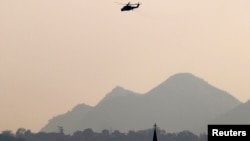As fighting continues in northern Myanmar, along China’s southern border, the government in Beijing is grappling with a flood of refugees, as well as questions about how Chinese authorities should respond to the conflict.
Myanmar’s military has declared martial law and a state of emergency in the northern area of the Kokang special region, but that has not put an end to the clashes with armed ethnic rebels.
The Myanmar government says that in addition to the Kokang fighters, Kachin and other ethnic rebel groups have joined the fight, which has already displaced tens of thousands.
Many have fled into China’s Zhenkang County in southern Yunnan province, a key crossing point near where the fighting is taking place. Residents there say that in addition to a flood of refugees, there is now a strong presence of armed forces on the Chinese side to maintain security, raising tensions.
The last round of fighting between rebels and the Myanmar army in 2009 led to the ousting of rebel leader Peng Jiasheng. Peng spent years in hiding, but now has returned and is seeking to reclaim his position as the head of the Kokang autonomous region.
Some of those who have fled are hoping he does just that.
“Many hope that Peng wins the fight and say that things were much better before he was ousted,” said Zhao, who works in a restaurant near the border. “They say that after Myanmar authorities took over, they have not been treated well,” he added.
Peng’s return to Kokang has also put increasing pressure on the Beijing government because of the sympathies that some Chinese feel for his cause and the fact that Kokang are ethnic Chinese.
Before the recent conflict began, Peng gave interviews to Chinese media and sent an open letter to Chinese around the world, urging them to support their brothers in Kokang.
That letter and recent photos posted online of dead Kokang in the streets have stirred up a nationalistic debate on the Internet, with some urging the Chinese government to take action. Some have even drawn comparisons to Crimea.
The Myanmar government has urged Beijing to prevent attacks from being launched from across the border.
But there also are signs of support from other ethnic groups inside Myanmar, one refugee told Chinese language broadcaster Phoenix Television.
The refugee said that the reason other groups are supporting the Kokang in this fight is “because we do not have ethnic equality.” He said the Myanmar government will not give them identification cards and because of that they will not be able to participate in the elections.
Myanmar will hold elections later this year, but many details are still being sorted out. Ethnic Kokang are not considered Burmese citizens but do have government issued ID cards. However, a recent ruling by Myanmar’s parliament means those cards will expire at the end of March, and card holders will be unable to vote. It is unclear if the law will be changed before the election.
In an interview with China’s Communist Party-backed Global Times late last year, Peng Jiasheng said that political talks are the only way to resolve Myanmar’s problems in the north, but he said that the group may have no choice but to fight. Peng also called on China to play a role in facilitating a solution.
Yun Sun, an East Asia fellow at the Stimson Center, a Washington D.C.-based research group, said that while Peng’s ambitions are relatively clear, he still faces obstacles.
“The problem here is Peng Jiasheng is not recognized by Burmese authorities as a legitimate political force so for him to gain that political capital he will have to start with something. And the military offensive in the Kokang region is clearly targeted at restoring that control and leading to a political legitimacy for him to play a role,” said Sun.
Myanmar-China relations have gone through a major shift since the country began taking steps toward democracy. The combination of the rebalance of U.S. presence to Asia and the cancelation of a major dam project in Myanmar has led some Chinese scholars to advocate more engagement with ethnic groups across the border as leverage.
But Sun said that supporting ethnic rebels against the government seems unlikely, because Beijing has much larger ambitions for national trade and energy exports.
“So from China’s perspective, the Myanmar government has much more to offer for China’s nationalist interests than the border ethnic groups. And if China wants to gain Myanmar’s government’s friendship, China should not adopt a position that aligns itself with border ethnic groups and China should not provide support to border ethnic groups,” said Sun.
Still, she said that given the porous nature of the border and the heavy amount of trade that goes on there, it is not inconceivable for some local actors to have different views from the central government and that they could be providing those across the border with support.
She added that while this does not represent the central government’s position, what the Chinese government will do to address the conflicting demands remains unclear.




